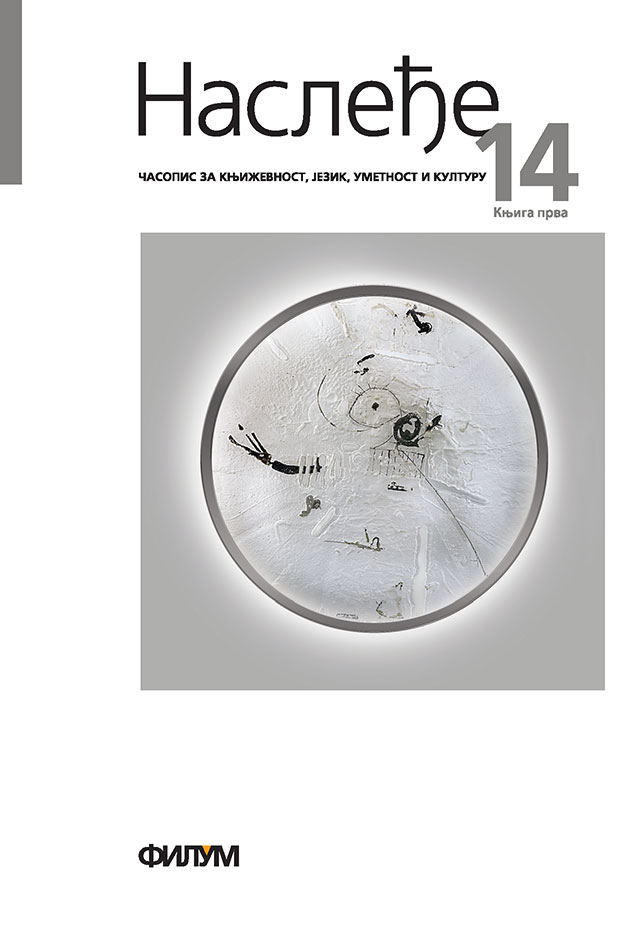THE DESERT ISLAND ARCHETYPE AND THE POST-APOCALYPTIC FICTION: THE ROAD, BY CORMAC MCCARTHY
Keywords:
архетип, пусто острво, катастрофа, постапокалиптична фикцијаAbstract
The paper proposes that the global popularity of Daniel Defoe’s Robinson Crusoe has transmogrified it into a modern myth, an archetype of its kind. This archetype, it is shown, is a core element of the so called postapocalyptic narratives. The work than investigates the the archetype’s role in Cormac McCarthy’s novel The Road and concludes that, by transcending the by and large conventional approaches of postapocalyptic fiction, McCarthy manages to reinvigorate the characteristic appeal of the archetype, as well as to preserve the aesthetic integrity of his prose.
References
1) Clarke, Thurson, Searching for Crusoe, ballantine, New York: Ballantine, 2001.
2) Watt, Ian, “Robinson Crusoe as a Myth”, Eighteenth Century English Literature, ed. by James L. Clifford, Oxford University Press, New York, 1960 (1959).
3) Tufayl, Ibn, Hayy Ibn Jaqzan, transl. by George N. Atiyeh, in Medieval Political Philosophy ed. by R. Lerner & M. Mahdi, Cornell University Press, Ithaca, New York 1963.
4) Wainwright, Martin, “Desert Island Scripts”, The Guardian, Saturday 22 March 2003.
5) Платон, Тимај, прев. Марјанца Пакиж, Еидос, Врњачка Бања, 1995.
6) Макарти, Кормак, Пут, прев. Весна Подгорац и Бранислава Јурашин, Beobook, Београд, 2007, 234.
7) Hausermann, Hans W, “Aspects of Life and Thought in Robinson Crusoe”, Review of English Studies, Vol. II, 1935 (No 44, October).
8) Defoe, Daniel, The Life and Adventures of Robinson Crusoe, written by himself, ed. by Doreen Roberts, Wordsworth Editions, Hertfordshire, 2000.
9) Varley, John, “The Manhattan Phone Book (Abridged)”, Bangs and Whimpers: Stories About the End of the World, edited by James Frenkel, Lowell House, 1999.
10) Coleridge, Samuel Taylor, Specimens of the Table Talk of the Late Samuel Taylor Coleridge, John Murray Albemarle Street, London, 1835.
11) Aldiss, Brian, Billion Year Spree, Doubleday & Company Inc, Garden City, New York, 1973.
12) Durrell, Lawrence, Reflections on a Marine Venus, Marlow & Company, New York, 1996 (1953).
2) Watt, Ian, “Robinson Crusoe as a Myth”, Eighteenth Century English Literature, ed. by James L. Clifford, Oxford University Press, New York, 1960 (1959).
3) Tufayl, Ibn, Hayy Ibn Jaqzan, transl. by George N. Atiyeh, in Medieval Political Philosophy ed. by R. Lerner & M. Mahdi, Cornell University Press, Ithaca, New York 1963.
4) Wainwright, Martin, “Desert Island Scripts”, The Guardian, Saturday 22 March 2003.
5) Платон, Тимај, прев. Марјанца Пакиж, Еидос, Врњачка Бања, 1995.
6) Макарти, Кормак, Пут, прев. Весна Подгорац и Бранислава Јурашин, Beobook, Београд, 2007, 234.
7) Hausermann, Hans W, “Aspects of Life and Thought in Robinson Crusoe”, Review of English Studies, Vol. II, 1935 (No 44, October).
8) Defoe, Daniel, The Life and Adventures of Robinson Crusoe, written by himself, ed. by Doreen Roberts, Wordsworth Editions, Hertfordshire, 2000.
9) Varley, John, “The Manhattan Phone Book (Abridged)”, Bangs and Whimpers: Stories About the End of the World, edited by James Frenkel, Lowell House, 1999.
10) Coleridge, Samuel Taylor, Specimens of the Table Talk of the Late Samuel Taylor Coleridge, John Murray Albemarle Street, London, 1835.
11) Aldiss, Brian, Billion Year Spree, Doubleday & Company Inc, Garden City, New York, 1973.
12) Durrell, Lawrence, Reflections on a Marine Venus, Marlow & Company, New York, 1996 (1953).
Downloads
Published
12-19-2009
How to Cite
Бубања, Н. М. (2009). THE DESERT ISLAND ARCHETYPE AND THE POST-APOCALYPTIC FICTION: THE ROAD, BY CORMAC MCCARTHY. Nasleđe, 6(14/1), 33–43. Retrieved from http://35.189.211.7/index.php/nasledje/article/view/209
Issue
Section
Articles






